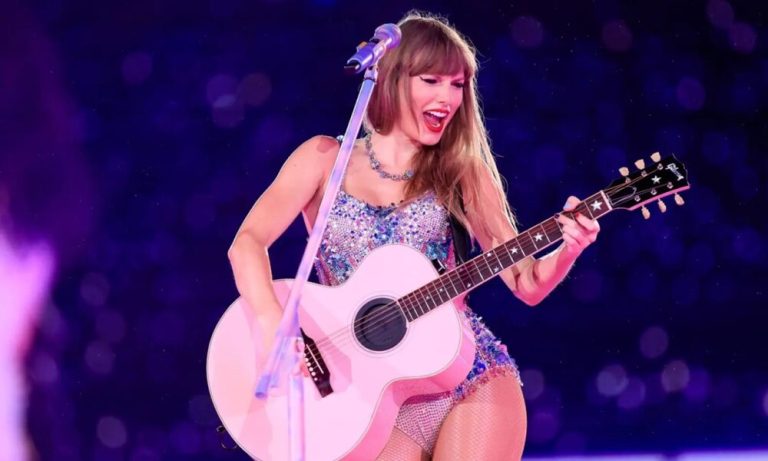Universal Music Group has not renewed its licensing deal with TikTok, amid a battle over artist pay, security and the use of AI.
Universal Music Group had threatened to stop licensing its music to TikTok following a breakdown in negotiations. It’s now a done deal: songs by UMG artists began to disappear from the platform at the end of the day on Wednesday.
The deletions began gradually on Wednesday evening. Official versions of recordings owned by UMG, such as “ Cruel Summer » by Taylor Swift, « Get Him Back » by Olivia Rodrigo and « Let the Light In » by Lana Del Rey, no longer appeared in search results. Additionally, videos featuring UMG songs (such as a Kylie Jenner post on “ Cherry » by Del Rey and a video by Dwayne Johnson on « Hustlin’ » by Rick Ross) had their audio cut. Videos now have a message at the bottom stating that audio has been removed due to copyright restrictions.
Just after midnight, some of Swift’s videos received the same treatment. Several videos of Justin Bieber on his page, including a performance of him singing ” Yummy ”, are now silent.
All of this is the result of a year of tense negotiations between UMG and TikTok, with the two companies having divergent views on what constitutes a fair deal for the use of the label’s music on the platform.
UMG published an open letter on Tuesday evening announcing that its licensing agreement with TikTok would expire on Wednesday and that negotiations for a new agreement were at an impasse. The world’s largest music company, whose artists include Taylor Swift, Billie Eilish, Olivia Rodrigo, Drake and even Kendrick Lamar, said it was taking a stand ” for the creative and commercial value of music. She claimed that TikTok, the hugely popular short-video app owned by Chinese company ByteDance, was responding to her concerns with ” indifference » or the “ intimidation » on three important questions: “ appropriate compensation for our artists and songwriters, protection of human artists from the harmful effects of AI, and online safety for TikTok users. »
“ TikTok has proposed paying its artists and songwriters at a rate that is only a fraction of the rate paid by large social platforms in a similar situation. Today, to show how little TikTok pays artists and songwriters, despite its massive and growing user base, rapidly increasing ad revenue, and growing reliance on music content, TikTok only represents about 1% of our total revenue, can we read in the open letter. Ultimately, TikTok is trying to create a business based on music, without paying fair value for music. »
Universal accused TikTok of trying to intimidate it into accepting a “ bad agreement ” in ” selectively removing music from some of our developing artists, while keeping our global stars who attract audiences’ attention on the platform “. Universal also claimed that TikTok allowed its platform to be “ flooded » of AI-generated recordings. The company described TikTok’s response to AI as ” nothing less than sponsoring the replacement of artists by AI. »
In a statement posted online, TikTok accused UMG of pushing its “ own greed before interests » artists and songwriters. “ Despite Universal’s rhetoric and misleading talk, the fact is that they have chosen to walk away from the powerful support of a platform with over a billion users that serves as a vehicle for promotion and discovery free for their talents,” TikTok said. The platform claims to have been able to conclude agreements with other labels and publishers, without however specifying the terms of these agreements.
Over the past five years, TikTok has become the music industry’s most influential marketing tool, launching the careers of up-and-coming artists, turning viral songs into smash hits, and propelling older catalog tracks to the top rankings of the Billboard. TikTok has been the launching pad for many singles, including “ Old Town Road » by Lil Nas Savage » by Megan Thee Stallion, among others. It’s undeniably a useful way for promotion, but UMG seems to be betting that the current revocation of the license will force TikTok back to the negotiating table.
With the music of UMG artists officially removed from the industry’s most popular marketing tool, the question is how musicians will promote their songs and whether this change will impact their distribution.






